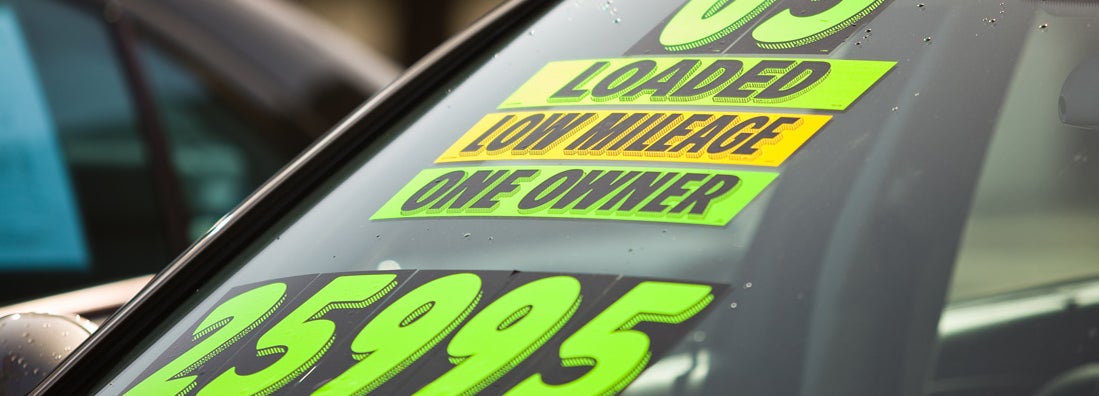Used Cars: What Are You Really Paying For?

Used car dealerships buy low and sell high, just like other retailers. But on the used car lot, what goes into the price isn't so obvious.
If you compare the Kelley Blue Book prices on the vehicle you want, you can see the:
- Trade-in value
- Private seller value
- Dealer value
The dealer value is almost always the highest of the three. This leads to the next question: Why is the dealer price always higher than if you were to buy the car from your neighbor?
At the dealership, you often pay for small costs, but they add up. These might include the:
- Car salesman commission
- Used car markup (which can be the most expensive part of the purchase)
- Extra warranties, if you decide to purchase one
- Features
- Financing
It's not a crime for salespeople and dealership owners to make a profit. Used car dealerships are businesses. But how do you make sure you're putting most of your money into the vehicle and not the dealer's wallet?
We put together this list to help. Also, m are sure you're covered with an affordable car insurance policy.
Watch for Excessive Used Car Markups
Used car markups are big business. In fact, used cars are more profitable for dealers than new cars.
Let's consider an example: There's a $4,000 difference between the trade-in value of a 2010 Toyota Camry XLE (what the dealer would pay you for it) and its dealer retail price (what the dealer would sell it for). That $4,000 is the dealer's expected profit. But that doesn't account for other price markups.
Dealers can mark up cars for any number of reasons. Some include:
- How much the dealership paid for the car
- Whether they got it as a trade-in or from a wholesale dealer, auction or private party
- How much it cost for repairs, cleaning, reconditioning and a few dealer-installed extras in order to get the car into sellable condition
- How much the dealership aims to make in profit for the month or the quarter
- The condition, mileage and make of the car
- Local demand for the vehicle (this one is really important)
Putting the Dealer Pricing Factors Into Perspective With an Example
In the middle of the winter in Denver or Seattle, used Subarus can sell at a much higher markup than used Ford sedans. This is because locals prefer the winter weather traction and reliability of a Subaru. If you are considering a vehicle that is popular in your area, you can expect the price to reflect that.
The same kinds of things will vary from place to place across the country and depending on the season. Take these factors into account so you can plan when you make a purchase.
Planning Your Price Negotiation Strategy for a Used Car
Dealerships need to make a profit. They deserve one, too. But how do you keep the markup from getting out of hand? The answer is simple: Research the dealer’s cost to buy, recondition and put the car on the lot. This is where your strategy will come from.
The issue is that because each used car is unique in wear, mileage and age, you will need to rely on more generalized information. This makes buying a used car more difficult than buying a new one. Here are some steps to get you started:
- Find the trade-in price listings at KBB (Kelley Blue Book) for a baseline.
- Match the specific mileage, engine size and trim package of the car in question.
- Assume the dealership paid something close to this number for the vehicle.
- Plan how you will sell your price to the dealer.
Know the Major Types of Car Salesman Commissions
Car salesmen receive a percentage of the margin on the cars they sell each month. Dealerships refer to this as car salesman commission. Because so few salesmen are salaried, it's in their best interest to hit sales goals to increase their pay.
Sometimes dealerships pay higher commissions for set increments in sales volume. It might look something like this:
- 20% of sales margin for 15 cars
- 30% for 25 cars
- 40% percent for 35 cars
This could work in your favor because higher volumes typically mean lower prices. But it also means salesmen are incentivized to get high prices for bigger commissions.
Of course, dealerships aren't going to tell you how they pay employees. So you're better off doing your research and taking things from there.
You can also work with the dealer's Internet department, which almost always sells by volume. These salespeople often receive bonuses as pay, based on the number of cars sold, regardless of the used car markup they charge.
Avoid Unnecessary Add-Ons and Fees to Save
You will always have to pay:
- Sales tax
- Registration
You might also have to pay a documentation fee for the paperwork preparation. This shouldn't be more than $100.
Anything beyond this is sketchy. You should not have to pay advertising fees, the dealership's shipping costs, or any other charges that the salesperson cannot justify to you in a satisfactory way.
The main place where you will encounter extra fluff in pricing is in the finance & insurance (F&I) office at the dealership. The F&I agent is usually the dealer's biggest source of profit. The F&I agent will try to sell you warranties, gap insurance, financing and other items that you can almost certainly purchase cheaper from your own credit union or insurance company.
Remember that this is the highest-paid employee on the lot. You are under no obligation to say yes to any of the agent's offers. In fact, by doing your research, standing your ground, and even walking away from a questionable contract, you might end up with a better deal than you planned.
Get a Deal on the Car, then Shop Around for Used Car Insurance
Once you've landed the best used car deal, make sure you don't sour it by overpaying on car insurance. As soon as you know which car you'll buy, talk to a local independent insurance agent.
Independent agents in our network aren't bound to one insurance company, so they can shop around to find you the best deal out there on the coverage you need. This means you can drive home with peace of mind, knowing that you got a great bargain on both your car and car insurance.
